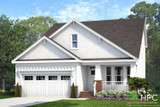Anyone who has searched for or purchased house plans online can attest to how easy it is to quickly become overwhelmed by the volume of plans that are available. Whether building a forever home, garage or investment property, homeowners can successfully navigate the search process when they know where to start, what questions to ask, and how they can most effectively (and efficiently) find what they’re looking for.
Georgia based Design Evolutions, Inc. building designer Kirya Duncan says the online pre-design plan market is great for both design professionals and consumers. Specifically, “consumers benefit because they’re able to browse through thousands of designs and choose a home plan from some of the nation’s top designers, paying only a fraction of the cost of a custom home design.”
Duncan notes that customers looking for plans are best served when they find a site with a diverse portfolio of pre-designed home plans. “The larger the pool of contributing professional designers, the better the chances of finding the ideal home design,” he continued.
Because of the vast number of choices in the online house plan marketplace, Ken Pieper, residential designer at Ken Pieper Signature Designs asserts that “searching through many thousands of plans online can be exhausting without a specific list. Be realistic and educate yourself on cost before starting this journey in order to eliminate many avenues for disappointment.”
The House Plan Company, a house plan marketing firm based in Eugene, Oregon compiled the most important considerations recommended by design professionals for homeowners to better navigate the online plan shopping experience. Here are five tips architects and designers recommend in order to save time and money when searching for the perfect house plans online:
- Create a concise “wish list.” This should include the family’s priorities for the home, including the architectural style of desired home, the square footage, how many floor levels, the number of bedrooms and bathrooms, and other design elements that are important to those who will call it home.
- Establish a budget. Be mindful of the cost before embarking on a new project and be sure the selected plan fits your budget. Keep in mind that just because two home designs have the same square footage, that doesn’t mean they will cost the same to build; the less complicated the design, the less costly the construction.
In addition to construction costs, the budget needs to encompass the lot that will be built on, the purchase of the house plan itself, landscaping and other elements that could arise as the project gets underway. This includes the development of site plans, additional engineering drawings or other plans that may be required by the city or county where the home is being built.
- Plan for the future. It’s rare to find a perfect home design, but when homeowners are looking, it’s important to consider not only the family’s immediate needs, but potential expansion and lifestyle changes that may be necessary down the line.
- Match the plan to your criteria. The best sites have search engines that offer the ability to search for plans using pre-defined criteria to quickly find the plans that align with your specific desires. Find a plan that is as close as possible to what fits your needs, or only needs minor modifications. This will save time and can also save hundreds or thousands of dollars.
- Ask questions. Make sure you understand the complete layout of the selected plan. And, in the event you want to make changes, before purchasing plans online, find out if the design professionals who created them offer plan modification services. It’s also important to find a reputable builder who can bring the plans to life.
“The pre-design plan market offers homeowners tremendous value,” said Rick McAlexander, CEO of The House Plan Company. “This market has made it possible for many people to build homes that are tailored to their needs without spending the time and money that might be required for a truly custom build.”
The advantages of buying house plans online are numerous. In addition to considerable cost and time savings as it relates to creating custom home plans, buyers have significantly more choice and the ability to search plans at their leisure. This affords the opportunity to locate plans by hundreds of architects and designers that appeal to the buyer’s design sensibilities. Online house plans can also serve as a great jumping off point for those who are interested in a custom design. With modifications, plans that are “close” can often be adjusted to achieve the right design elements the buyer is searching for.
“The pre-design plan market is here to stay. This market has made it possible for millions of people to realize their dream of building a home that is custom to their wants, needs and lifestyle,” said Duncan.



